Abdul Majid Darr was born in Jhelum in Punjab, Pakistan in 1925. His mother died whilst giving birth to him so his father remarried when he was six years old and went on to have two more children with his second wife. Abdul Majid was happy about this as it meant he would have siblings. These were the happiest years of his life but sadly his father died when he was at the tender age of thirteen years old. Following this, he was instructed by his stepmother to provide for the family. He learned the trade of tailoring from his relatives who had an existing tailoring business in Pakistan. He was a quick learner and soon became renowned in the local area. At age sixteen he was invited to go to Tehran by his maternal uncle, who was already working in Iran as a Government Official. Therefore he decided to immigrate to Tehran and continue to provide for his family. After four years of working abroad, he had accumulated enough savings and decided that he wanted to get married. So he went back to Pakistan and his stepmother arranged a suitor, he agreed with her choice and he got married to eighteen year old Balqis Begum. After the marriage Abdul Majid returned to Iran; however, his bride stayed in Pakistan with his stepmother, as this was an expectation at the time. Balqis was pregnant with her first child and so Abdul Majid went back to Pakistan for the birth. Following the birth of the child, Abdul Majid decided to return to Iran together with his wife and new-born son, Arshad Tariq Darr.
The lifestyle in Iran was described to Nazreen by her mother as ‘amazing’. She had a nanny to support her with her son, cleaners to help with the housework and cooks. She lived a comfortable lifestyle in contrast to her life in Pakistan; the family were very happy. Balqis and her husband had also developed friendships with local residents and learnt Farsi, the native language. Some years later she gave birth to a daughter in Iran, Parveen Akhtar.
Abdul Majid’s business was very successful due to the demands of men’s suits. Iran was a secular and modern society in those days. Most people wore western clothing and were smartly dressed. Most of his clients were westerners living in Iran and working for British oil companies. He learned to speak English during this time to communicate effectively with his customers.
In 1955 the couple decided to immigrate to the United Kingdom, as Nazreen’s maternal grandfather insisted that the British education system was far more superior to Iran’s. So they agreed that Balqis and the children would return to Pakistan until Abdul Majid established himself and could provide comfortably for his family and his extended family.
As a family, they decided to leave Iran together, whilst Nazreen’s mother and siblings boarded a flight to Pakistan. Her father departed from Abadan airport with £400 in his pocket for London. Upon arrival, he caught a taxi from the airport to the train station. He wanted to go to Bradford but nearly ended up in Bedford as the staff had difficulty understanding his Pakistani accent. He arrived in Bradford and stayed with a friend for four to five weeks before moving to 10, Bowland Street which was a back-to-back house.
He started to look for work straight away as he needed to invite his family to join him. Nazreen recalls ‘If I remember correctly, he worked at O.B Listers where he earned £9 per week’. Similar to most migrants he experienced the clash of cultures, even though he spoke the language; he did not how the system worked so things were difficult. In those days, Halal food was difficult to source, so he had to rely on kosher butchers. In the early days, Bradford did not have a Masjid so praying in congregation was a big issue.
Within a year or so, in 1956 Abdul Majid’s family had joined him in the UK. They rented a small back-to-back house, knowing it would be a temporary measure as the family would soon move into their first home (40 Earl Street) another back-to-back property which cost around £100 to purchase. The mortgage on this property was £1 per month.
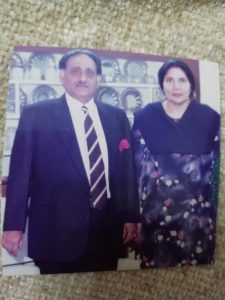 Nazreen’s older brother and sister were fluent in Farsi from a young age; though they did not speak any English upon their arrival in England. They soon picked the language up though and started attending schools in Bradford being amongst the first children of South Asian origin to attend schools. Nazreen was born in 1957, probably one of the first South Asian children to be born here in Bradford. She and her siblings attended a Masjid – the first in Bradford. They were one of a handful of children who attended at the time. The sisters were featured along with other children in an article in Mashriq, an Urdu newspaper published weekly from London. The article was focused on attendance at the Masjid of the first generation of children of Pakistani descent who were being brought up here in the United Kingdom. It speculated whether they would learn about their religion and culture and, be able to retain their religious and cultural identity or if they would end up being fully integrated as British children without any knowledge of their cultural heritage and roots.
Nazreen’s older brother and sister were fluent in Farsi from a young age; though they did not speak any English upon their arrival in England. They soon picked the language up though and started attending schools in Bradford being amongst the first children of South Asian origin to attend schools. Nazreen was born in 1957, probably one of the first South Asian children to be born here in Bradford. She and her siblings attended a Masjid – the first in Bradford. They were one of a handful of children who attended at the time. The sisters were featured along with other children in an article in Mashriq, an Urdu newspaper published weekly from London. The article was focused on attendance at the Masjid of the first generation of children of Pakistani descent who were being brought up here in the United Kingdom. It speculated whether they would learn about their religion and culture and, be able to retain their religious and cultural identity or if they would end up being fully integrated as British children without any knowledge of their cultural heritage and roots.
Having an entrepreneurial spirit and experience of running a business in Iran, Abdul Majid set up his own business a few times, sometimes,it didn’t work out and at other times he had to move to another property. He opened his business a few times before finally having a shop on Manchester Road which was a successful business; his clientele were mainly White British people so he had built up a good rapport with them. His first customer and good friend Mr Hardwright supported him throughout and advertised his suits well as he wore them. The shop ended up being demolished so a new premised was located on Little Horton Lane, which remained the family business until some time. He then rented a property on Westgate Hill, at the top end of town; the business was run from there for around eight years. The final business property was on Morley Street until his retirement.
The family undertook a trip to Pakistan by road in the early 1960s as Nazreen’s Chacha (younger paternal uncle) was getting married. She was a toddler then so cannot remember much but knows that her father had purchased a brand-new car for the trip.
The family lived in a neighbourhood where they were one of a few Asian families, Nazreen’s mum learned to speak English and her siblings and she became fluent very quickly too. They played with the neighbour’s children and their school friends were mainly of White backgrounds. So they didn’t really have any role models other than their parents. Nazreen says ‘they taught us to be proactive and adapt to situations which has helped my brother and sister and me throughout our lives’.
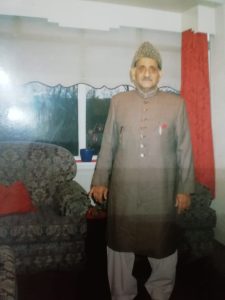
Once Nazreen and her siblings were all grown up and married, her father retired in 1987 at the age of sixty-two. The house that her parents lived in was sold, and then the couple went to Saudi Arabia to perform the Hajj. The couple had a house built in Pakistan prior to her Abdul Majid’s retirement and so they went to live there to spend time with their extended family. However, the couple experienced several bereavements of family members and their health started to deteriorate so Nazreen and her siblings persuaded them to come back to England. They spent their remaining days here in the UK.
Author – Aamnah Rahman
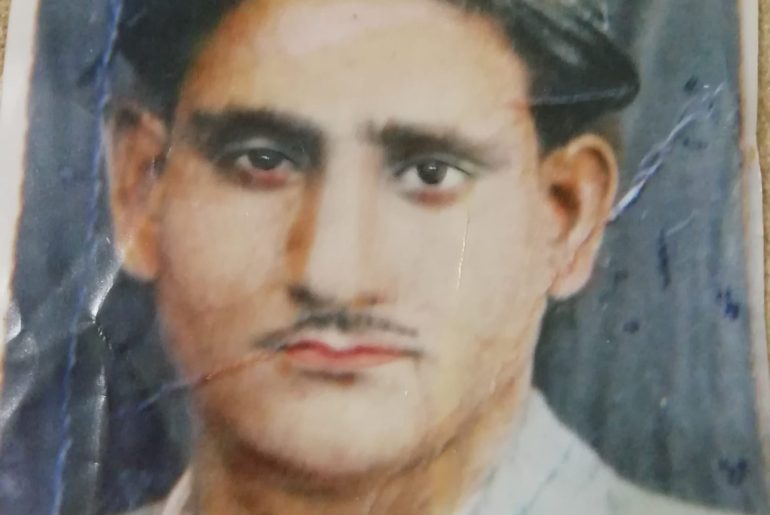
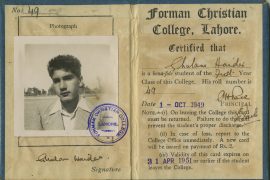
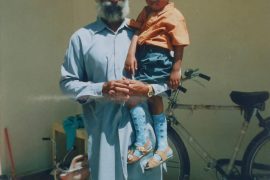
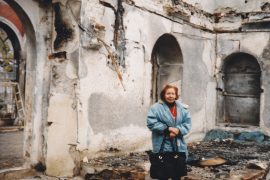
Comments are closed.